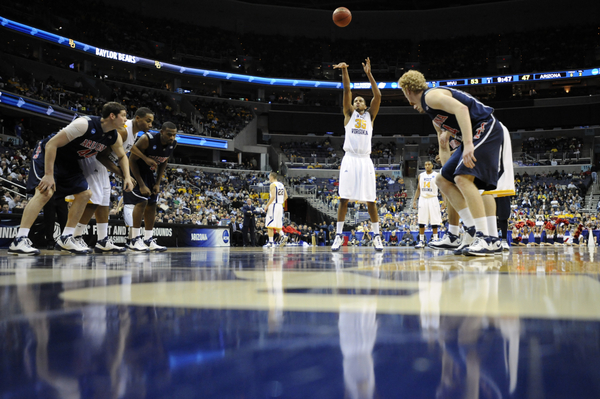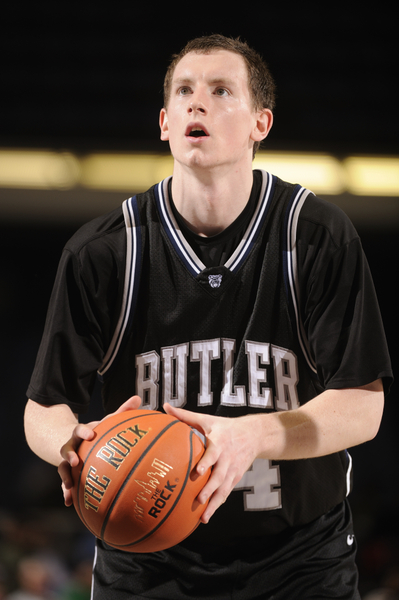Five Factors That Will Lose You the Title
Posted by rtmsf on April 2nd, 2010We’ve spent most of the week reading and writing about the various ways that one of Michigan State, Butler, Duke or West Virginia will end up winning the national title and cutting the nets down on Monday night. Duke is the favorite, but bookmakers give all four teams a reasonable shot to win it. But often it doesn’t come down to the elevation of greatness in these situations, but instead the avoidance of weakness. Simply playing your average game is sometimes enough to advance if you avoid a bugaboo that has plagued your team in its losses this year. For example, if you go cold from three (see: Kentucky), or can’t make a foul shot (see: Texas), or start throwing the ball into the crowd (see: Syracuse), or over-rely on your starters (see: Ohio State) or get key players in foul trouble (see: Baylor)… the entire house of cards can come crashing down. Let’s take a look at the four remaining teams standing to see what, if anything, could cause problems for them this weekend.
Foul Shooting
Duke (76.1%) and Butler (73.9%) are both excellent foul shooting teams, while West Virginia (70.3%) and Michigan State (68.8%) are best described as mediocre. None of the four are downright terrible, though. Michigan State lost games when they shot well , average and poorly from the line, so it doesn’t seem to impact their overall performance much. Contrast that with WVU who lost three of its six games this season (@ ND, @ UConn, vs. Villanova) when they shot a collective 32-59 (54%) from the line, so they certainly appear vulnerable in that regard. Both the Devils and Mountaineers average about 22% of their total points from the foul line, so keep an eye on WVU’s foul shooters early (especially the better ones such as Da’Sean Butler, Devin Ebanks and Kevin Jones) to see if they’re making or missing their attempts. If they’re not going down, West Virginia is going to have to replace those points from somewhere else.
Three-Point Shooting
Butler takes 40% of its field goal attempts from behind the arc even though they only convert on 34.5% of them. In all four of their losses this season, the Bulldogs shot at or worse than that percentage, but it has to be noted that despite hitting only 6-24 threes against Syracuse last week, they still managed to win. Against Michigan State, you should probably figure that will need to hit at least six bombs to put themselves in a reasonable position to win the game. MSU doesn’t take (14) or make (5) very many threes per game, so an off-shooting night from deep from the Spartans probably won’t impact their offense all that much. Duke and WVU are equally reliant on the long ball, but Duke shoots it substantially better (38.2% vs. 33.6%). Both teams have proven throughout the year that they can win games regardless of whether the threes are dropping or not. The team that appears most vulnerable is this area is Butler.
Turnovers
Turnovers can kill any team if there are too many of them, but Duke (16.4% TO rate) and West Virginia (18.4%) are solid when it comes to taking care of the ball. Both force more TOs against their opponents than they give up, but neither rely on turnovers to necessarily fuel their offense — it’s just an added bonus when they get one. Butler is also ok at 19.1%, but Michigan State is in the danger zone here. The Spartans turn the ball over 21% of the time, highest among the Final Four teams, and are susceptible to games where every one in four possessions ends in a miscue (nine times this year). When Sparty goes over their season average of turnovers, they’re not a great team: 7-5 is MSU’s record when they commit turnovers greater than 22% of their possessions. This is something to keep an eye on in the first half against Butler, as both Syracuse and K-State had trouble figuring out the Bulldog defense, and Butler is far better at causing turnovers than Michigan State is.
Lack of Bench Support
This is an interesting statistic because three of the four Final Four teams really don’t utilize their benches very much. Butler, Duke and West Virginia are all in the bottom sixty teams in America in terms of bench minutes. Michigan State goes a little deeper than those three, but in giving the bench 32.1% of the available minutes, it’s not like Tom Izzo is doing anything crazy (the national average is 31%). Minutes only tell part of the story, though, and what we’re really talking about is production with those minutes. Keep an eye on these four names — MSU’s Draymond Green, Duke’s Miles Plumlee, WVU’s John Flowers and Butler’s Shawn Vanzant. Each of these guys has given his team a big lift in scoring, rebounding and/or passing during the first four games of the NCAA Tournament. In rank order of importance to his team’s success, it would go: Green, Plumlee, Flowers, Vanzant. If you’re looking for a telltale signal that a team might be in trouble on Saturday, keep an eye on the expected production from Green (10/8/3 assts) or Plumlee (5/5) because without it that puts even more pressure on the starters for both Michigan State and Duke.
Foul Trouble
Many of the players on these four teams are very good at staying out of foul trouble. For example, Duke’s big three scorers of Nolan Smith, Jon Scheyer and Kyle Singler average only about two fouls per game. Given the high number of minutes that they play and necessity to the offense, it’s an absolute must for Coach K to have them on the floor. Michigan State has several players with a tendency for foul trouble, including Delvon Roe, Raymar Morgan and Draymond Green, but Tom Izzo does a good job in spreading out the minutes so that this doesn’t seem to affect his team’s fortunes all that much. West Virginia and Butler are a little more dicey, though, especially the Bulldogs. Matt Howard’s foul trouble all year has been well-documented, but as a team when Butler is reaching a lot (or at least getting called for it), they tend to lose. In games where they committed 23 or more fouls, they were 2-3 this season. In four of those five games, Howard was disqualified. This is definitely something to keep an eye on, especially in light of the fact that Howard has only averaged 3.0 fouls per game during the NCAA Tournament thus far. It might be a different story against all the bulk that MSU can throw at him underneath, however.












































